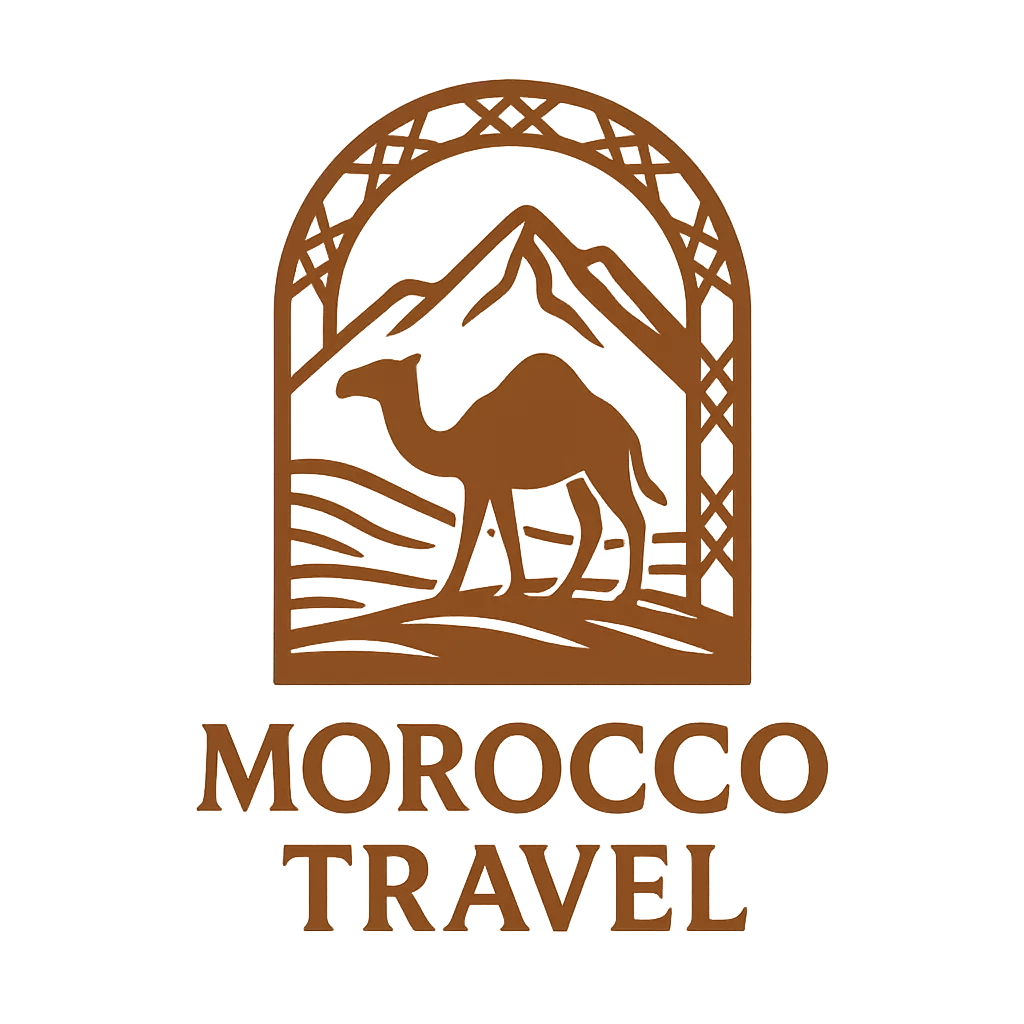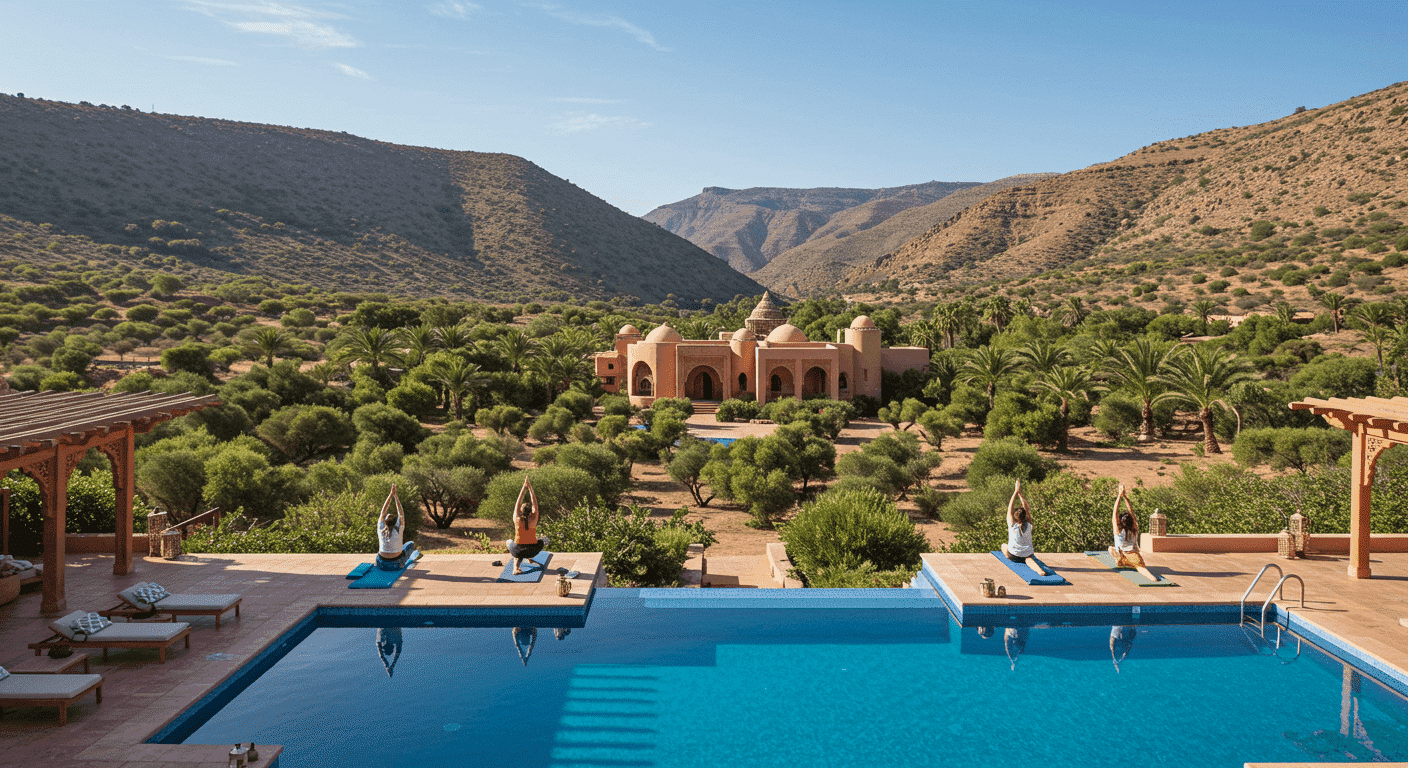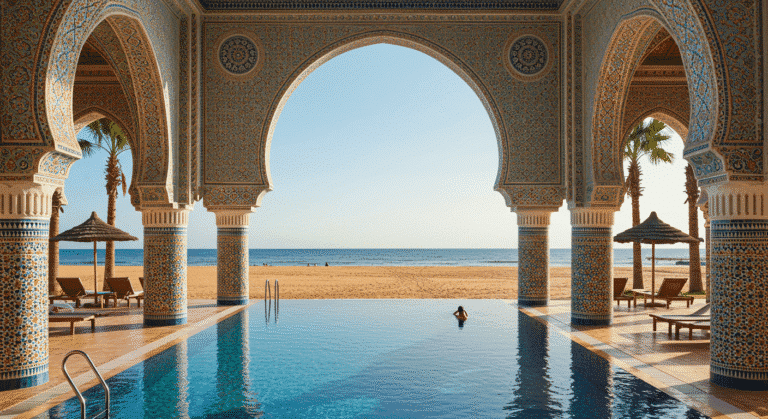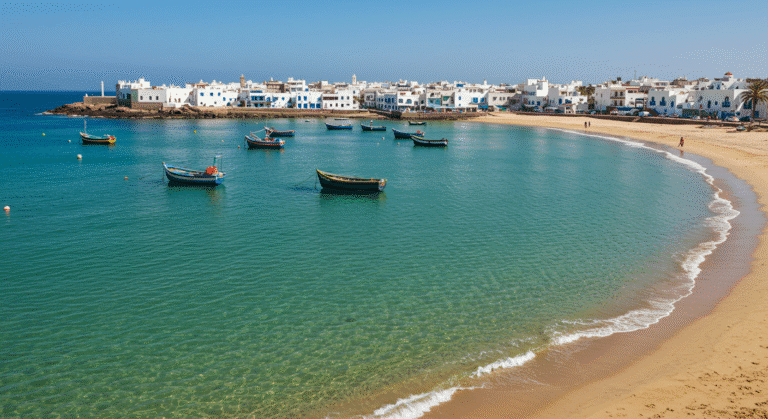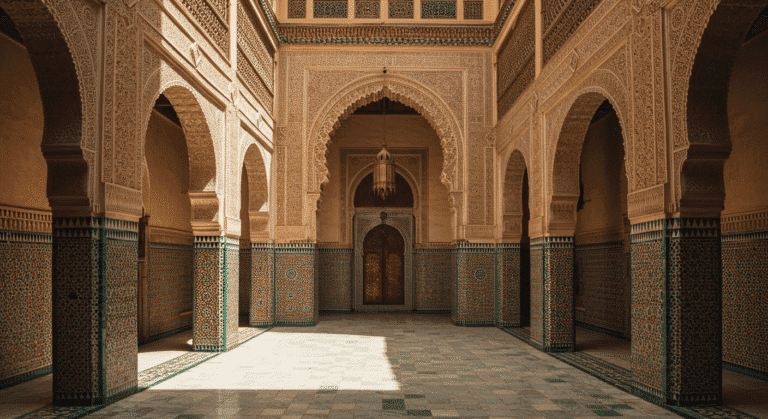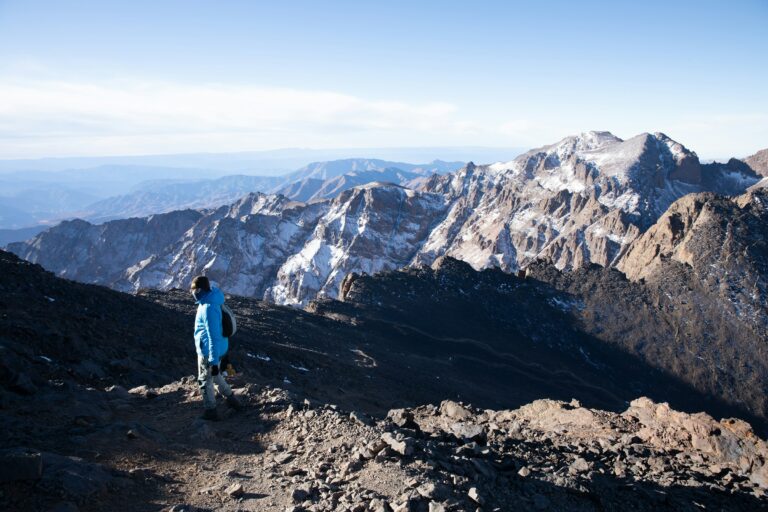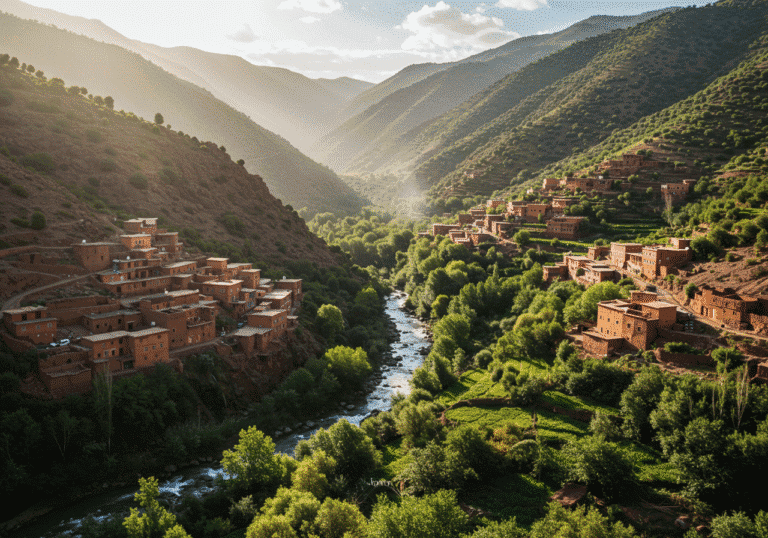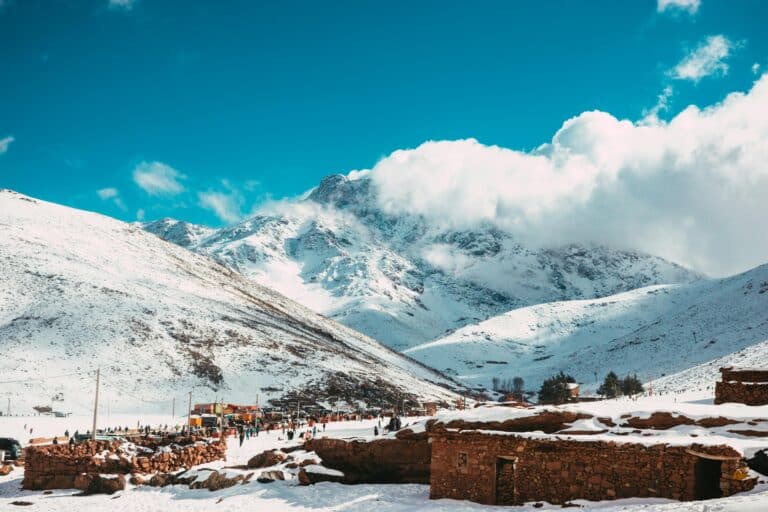Top Wellness Retreats in Morocco 2025
Is Morocco truly transforming into the world’s next wellness capital? While Bali and Costa Rica have long dominated the wellness tourism scene, recent data shows Morocco experiencing a 47% surge in wellness-focused travelers since 2023. This North African gem combines ancient healing traditions with modern luxury in settings that range from Saharan dunes to coastal havens and mountain sanctuaries. Morocco’s unique blend of Berber, Arabic, and French influences creates wellness experiences unlike anywhere else on earth, with retreats that incorporate hammam rituals dating back centuries alongside cutting-edge treatments. Whether you seek spiritual renewal, physical rejuvenation, or mental clarity, Morocco offers immersive wellness journeys that connect deeply with its extraordinary landscapes and cultural heritage.
Travel Checklist / What to Pack
Preparing for a wellness retreat in Morocco requires thoughtful packing to ensure your journey toward relaxation and rejuvenation remains stress-free:
- Clothing Essentials:
- Lightweight, breathable fabrics (cotton, linen)
- Modest attire respecting local customs (covering shoulders and knees)
- Layers for temperature fluctuations (especially in desert and mountain retreats)
- Comfortable yoga/meditation wear
- Swimwear for retreat pools and thermal experiences
- Walking shoes for nature hikes and meditative walks
- Wellness Accessories:
- Personal yoga mat (if preferred over communal options)
- Reusable water bottle (staying hydrated is crucial in Morocco’s climate)
- Journal for reflection and mindfulness practices
- Meditation cushion if you have space (though most retreats provide these)
- Documents & Tech:
- Passport valid for at least 6 months beyond your stay
- Travel insurance with wellness treatment coverage
- Retreat booking confirmations
- Downloaded meditation apps (many retreats have limited WiFi)
- Adapters for Moroccan outlets (type C/E plugs)
- Personal Care:
- Natural sunscreen (SPF 50+ recommended)
- Organic insect repellent
- Essential oils for travel anxiety or sleep support
- Personal toiletries (though luxury retreats provide artisanal options)
- Rehydration supplements for desert retreats
Pro Tip: Pack a traditional Moroccan textile as your yoga or meditation wrap. Not only will it serve as a functional item during your retreat, but it also makes for a meaningful souvenir that embodies your wellness journey in Morocco.
Best Time to Visit
Timing your wellness retreat in Morocco can dramatically enhance your experience, with each season offering distinct advantages:
Spring (March to May): Widely considered the optimal season with temperatures ranging from 59-77°F (15-25°C). Spring offers 40% fewer crowds than summer months while showcasing Morocco’s countryside in full bloom. Many retreats incorporate seasonal rose harvests into treatments during May, particularly in the Valley of Roses near Ouarzazate.
Fall (September to November): The second-best window with similar temperatures to spring. Retreat bookings are typically 25% more available than in April/May, with marginally lower rates. Fall retreats often feature harvest-themed wellness programs incorporating locally sourced ingredients.
Winter (December to February): An excellent choice for desert wellness experiences, as Sahara retreats offer comfortable daytime temperatures around 68°F (20°C). Mountain retreats in the Atlas range provide unique thermal experiences contrasting crisp mountain air with traditional hammams. Retreats are approximately 35% less expensive during this period except during holiday weeks.
Summer (June to August): Best limited to coastal retreats like Essaouira or northern mountain sanctuaries, as temperatures elsewhere regularly exceed 100°F (38°C). Despite the heat, summer solstice wellness gatherings have gained popularity, with 28% of retreats offering special programming around this time.
Data-driven insight: November retreats show the optimal balance of value and experience, with rates averaging 22% lower than peak season while still offering ideal weather conditions and seasonal wellness ingredients like saffron and argan harvests.
Step-by-Step Itinerary
Day 1: Arrival & Gentle Introduction to Moroccan Wellness
Begin your journey in Marrakech, the gateway to Morocco’s wellness landscape. Upon arrival at your chosen retreat:
- Morning: Transport from Marrakech Menara Airport to your retreat (typically 30-45 minutes depending on location)
- Afternoon: Welcome ceremony with traditional Moroccan mint tea infused with local herbs
- Evening: Gentle restorative yoga session followed by a plant-based Moroccan dinner featuring local organic produce
Wellness Insight: Traditional Moroccan welcome rituals are designed to ground travelers after their journey. The blend of mint and verbena in your welcome tea serves as a natural digestive aid and helps reset your circadian rhythm.
Day 2: Ancient Hammam Rituals & Aromatherapy
- Morning: Sunrise meditation in a garden setting, followed by a light breakfast featuring local fruits and nut butters
- Mid-morning: Traditional hammam experience (2-3 hours)
- Steam cleansing with eucalyptus black soap
- Kessa glove exfoliation
- Rhassoul clay mask derived from the Atlas Mountains
- Argan oil massage using techniques passed down through generations
- Afternoon: Aromatherapy workshop learning about Morocco’s essential oil traditions
- Evening: Sound healing session featuring traditional Gnawa music
Hidden Gem: Ask your hammam attendant about the specific origins of the clay used in your treatment. Different regions of Morocco produce clays with varying mineral contents and therapeutic properties.
Day 3: Mountain Sanctuary & Berber Healing Traditions
- Morning: Early transfer to the Atlas Mountains (approximately 1.5 hours from Marrakech)
- Mid-morning: Guided meditation hike through juniper forests
- Afternoon:
- Berber tea ceremony with a local healer
- Introduction to traditional Berber herbalism
- Hands-on workshop creating your personal herbal remedy bundle
- Evening: Return to retreat for a traditional tagine dinner prepared with medicinal herbs and spices
Cultural Insight: Berber healing traditions incorporate the concept of balance between hot and cold energies within the body. Your personalized herbal remedy will be crafted to address your specific energetic needs.
Day 4: Desert Mindfulness & Star Meditation
- Morning: Optional transfer to desert retreat location (4 hours from Marrakech, or continue your mountain program if preferred)
- Afternoon: Desert meditation practice focused on grounding and presence
- Evening:
- Sunset yoga on the dunes
- Traditional vegetarian desert feast
- Guided stargazing meditation utilizing ancient Berber celestial knowledge
Mindfulness Note: Desert landscapes create unique opportunities for presence practices. The stark environment minimizes distractions, while the vast horizon encourages expanded awareness.
Day 5: Coastal Renewal & Thalassotherapy
- Morning: Transfer to coastal retreat near Essaouira (approximately 2.5 hours from Marrakech)
- Afternoon: Thalassotherapy session utilizing mineral-rich Atlantic seawater and seaweed
- Evening: Beach meditation and breathing exercises harnessing negative ions from crashing waves
Ocean Therapy: Morocco’s Atlantic coast offers unique wellness benefits compared to Mediterranean destinations, with 27% higher mineral content in its waters and distinctive brown algae used in treatments that contain up to five times more iodine than other varieties.
Day 6: Integration & Personalized Wellness
- Morning: Personal consultation with retreat wellness expert
- Afternoon: Customized treatment based on your body’s needs:
- Argan oil massage for relaxation
- Pressure point therapy for energy balancing
- Salt scrub for detoxification
- Evening: Intention-setting ceremony for taking wellness practices home
Personalization Key: The most effective retreats adapt to your evolving needs. By day six, facilitators can identify specific adaptations to maximize benefits for your unique constitution.
Day 7: Departure & Wellness Extension
- Morning: Sunrise gratitude practice
- Mid-morning: Final nutrition session with retreat chef, learning to incorporate Moroccan wellness ingredients into your home cooking
- Afternoon: Departure with personalized wellness continuation plan
Transition Tip: Request your retreat’s specialized departure package, which typically includes herbal tea blends and aromatherapy oils to ease the transition back to daily life.
Budget Breakdown
Understanding the financial landscape of Moroccan wellness retreats helps you select the experience that best aligns with your wellness goals and budget:
Accommodation & Program Costs (per person, 7 days):
- Budget Wellness Experience: 900-1,300 USD (garden accommodations, group activities)
- Mid-Range Retreat: 1,800-2,700 USD (private room, semi-private sessions)
- Luxury Wellness Immersion: 3,500-6,000 USD (luxury suite, private guides, customized program)
Transportation:
- International Flights to Casablanca or Marrakech: 600-1,500 USD (depending on origin)
- Private Airport Transfers: 30-75 USD per journey
- Between-Retreat Transfers: 50-200 USD (depending on distance)
Additional Wellness Services:
- Specialized One-on-One Healing Sessions: 75-150 USD per hour
- Private Yoga Instruction: 50-90 USD per session
- Custom Herbal Formulations: 40-120 USD
Meals & Extras:
- Most retreats include full board with wellness-focused cuisine
- Optional specialty juices and elixirs: 8-15 USD
- Wellness products to take home: 25-200 USD (artisanal soaps, oils, herbal remedies)
Insider Savings: Book retreats that move between locations (desert, mountain, coast) rather than arranging separate stays. Integrated programs typically cost 30% less than booking individual experiences while offering seamless transitions.
Value Secret: Newly opened retreats often offer “soft opening” rates that are 35-40% lower than established properties while still providing excellent services as they build their reputation.
Sustainable or Cultural Alternatives
Morocco’s wellness landscape includes options that prioritize ecological responsibility and authentic cultural immersion:
Eco-Friendly Wellness Options:
- Solar-Powered Desert Retreats: Experience off-grid luxury at retreats like Azalai Desert Camp, which operates entirely on solar power while offering world-class wellness facilities.
- Permaculture Wellness Centers: Participate in garden-to-treatment experiences where your body scrubs and massage oils come from plants you help harvest.
- Water Conservation Retreats: Properties like Kasbah du Toubkal in the Atlas Mountains implement innovative water recycling systems, reducing consumption by 70% compared to standard hotels.
Cultural Immersion Wellness:
- Berber Family Stays: Experience traditional healing in authentic settings with families who have practiced indigenous wellness traditions for generations.
- Artisan Wellness Workshops: Learn traditional craft techniques as meditative practices, creating pottery or textiles using ancient methods that promote mindfulness.
- Sufi-Inspired Retreats: Engage with the spiritual dimensions of wellness through programs based on Sufi traditions of movement, breath, and contemplation.
Inclusive Options:
- Family Wellness Programs: Retreats like Paradis Plage offer specialized programs where children learn age-appropriate mindfulness while parents enjoy treatments.
- Accessibility-Focused Retreats: Several new properties provide adaptive wellness experiences with modified treatments for varying mobility needs.
- Digital Nomad Wellness: Combined work/wellness spaces offering high-speed internet alongside daily yoga and treatments, particularly in Essaouira and Taghazout.
Community Impact: Choose retreats that partner with local communities, where at least 35% of staff come from nearby villages and ingredients are sourced from within a 50-mile radius.
Food & Dining Suggestions
Moroccan wellness cuisine represents a perfect marriage of nutritional science and centuries-old culinary wisdom:
Essential Wellness Foods:
- Argan Oil: Morocco’s liquid gold contains 2.5 times more vitamin E than olive oil, supporting skin regeneration from within.
- Preserved Lemon: Fermented for enhanced probiotic content, adding digestive benefits beyond fresh citrus.
- Cumin-Spiced Dishes: Traditional spice blends incorporate cumin, known to improve digestion and containing iron levels three times higher than spinach.
- Rose Water: Used in desserts and morning elixirs for its anti-inflammatory properties and mood-enhancing aromatherapy benefits.
Must-Try Wellness Dining Experiences:
- Dawn Detox Juice Ritual: Begin your day with freshly pressed pomegranate, orange, and mint juice at sunrise in a rooftop garden.
- Berber Breakfast: Organic barley porridge with bee pollen, local honey, and figs delivers sustained energy through the morning.
- Desert Plant Tasting: Sample rare desert-adapted plants like Saharan acacia and desert truffle, incorporated into innovative wellness cuisine.
- Mountain Herb Tagine: Slow-cooked vegetables with over 18 medicinal herbs and spices, designed to reduce inflammation and boost immunity.
Retreat Dining Recommendations:
- Kasbah Bab Ourika: Their garden-to-table program features 57 varieties of organic vegetables grown on-site.
- Peacock Pavilions: Offers sunset nutrition workshops followed by a customized dinner based on your body’s unique needs.
- Riad Mena & Beyond: Creates personalized fasting and refeeding programs supervised by nutrition experts.
Personal Recommendation: Try the Moroccan breakfast ritual of amlou (argan oil blended with almonds and honey) spread on freshly baked gluten-free bread while watching the morning light illuminate the Atlas Mountains. This traditional energy food has sustained Berber healers for centuries during their plant-gathering expeditions.
Common Mistakes to Avoid
Even seasoned wellness travelers can encounter pitfalls when exploring Morocco’s retreat landscape:
Booking Blunders:
- Overlooking Seasonality: Avoid desert retreats in July/August when temperatures regularly exceed 110°F (43°C), making outdoor practices nearly impossible.
- Ignoring Religious Calendars: Wellness availability decreases by approximately 40% during Ramadan, with modified hours and services.
- Mismatching Wellness Philosophies: Research whether retreats focus on fitness, spiritual practices, or medical wellness, as approaches vary dramatically.
Cultural Missteps:
- Inappropriate Attire: Always pack modest yoga wear; even at wellness retreats, revealing clothing can cause discomfort for local staff.
- Hammam Confusion: First-timers often misunderstand the hammam ritual. Prepare for a communal, directive experience rather than a private, gentle spa treatment.
- Photographing Without Permission: Many traditional healers consider their practices sacred and may object to documentation.
Wellness Experience Errors:
- Rushing Between Treatments: Morocco’s wellness traditions require integration time; booking treatments back-to-back reduces their effectiveness by approximately 60%.
- Neglecting Hydration: Morocco’s dry climate demands 30-50% more water intake than you might need elsewhere, especially during detox programs.
- Overcommitting to Activities: Many visitors pack schedules too tightly, undermining the core purpose of restoration.
Expert Insight: Rather than sampling numerous treatments, select one traditional practice (hammam, Berber massage, or herbalism) and experience it multiple times during your stay. Research shows therapeutic benefits increase by 40% with repeated, deepening experiences rather than varied sampling.
Safety & Travel Tips
Ensuring a smooth wellness journey requires attention to practical matters alongside your spiritual and physical rejuvenation:
Health Precautions:
- Retreat Medical Screening: Premium wellness centers now offer optional health screenings upon arrival, establishing personalized treatment plans.
- Water Safety: Drink only bottled or filtered water; even high-end retreats may have tap water unsuitable for visitors.
- Sun Protection: Morocco receives 29% more UV radiation than Mediterranean Europe; use SPF 50+ and limit sun exposure between 11am-3pm.
- Travel Insurance: Select policies covering alternative treatments, as standard insurance typically excludes 70% of wellness therapies.
Practical Navigation:
- Digital Preparation: Download the Morocco Offline Maps Pro app, which includes retreat locations often missing from standard mapping services.
- Communication: Purchase an Inwi SIM card (available at airports) for the strongest coverage in remote wellness locations.
- Transportation Between Retreats: Book transfers through your accommodation rather than arranging independently for access to exclusive routes and comfort vehicles.
Cultural Awareness:
- Respectful Photography: Always request permission before photographing people, particularly in rural wellness settings.
- Gratuity Guidelines: Wellness service providers typically receive 10-15% tips, preferably in Moroccan dirham rather than foreign currency.
- Gender Considerations: Some traditional treatments are gender-specific; most retreats provide alternatives if preferred.
Local Insight: When visiting mountain or desert retreats, the most reliable safety measure is developing a relationship with local guides. The Berber concept of “diffa” (protection of guests) ensures that connected visitors receive extra attention to safety and comfort.
Morocco stands uniquely positioned at the crossroads of ancient healing traditions and modern wellness innovation. From dune-surrounded desert sanctuaries to mountain retreats nestled among aromatic herb gardens, this North African wellness haven offers transformative experiences that engage all senses. The country’s wellness landscape draws from Berber, Arabic, and European influences to create healing journeys unavailable anywhere else on earth. Whether seeking spiritual connection, physical rejuvenation, or simply sacred space away from daily demands, Morocco’s diverse retreat offerings provide pathways to profound well-being against breathtaking natural backdrops.
Ready to experience Morocco’s transformative wellness traditions? Share your retreat dreams in the comments below, or subscribe for our upcoming guides to specific Moroccan healing practices and exclusive retreat discounts for our community members.
FAQs
Do I need a visa to visit wellness retreats in Morocco?
Most visitors from North America, the EU, and many other countries can stay visa-free in Morocco for up to 90 days. However, always check the latest requirements through official channels before booking, as regulations occasionally change. Your passport should be valid for at least six months beyond your planned departure date.
Are Moroccan wellness retreats suitable for solo female travelers?
Absolutely. Morocco has seen a 53% increase in solo female wellness travelers since 2023. Established retreats provide secure environments with private transfers and comprehensive support. Many now offer women-only program dates featuring female guides and practitioners for enhanced comfort.
Can wellness retreats accommodate dietary restrictions?
Yes, Morocco’s top wellness destinations have embraced diverse dietary needs. Advance notice allows retreats to prepare appropriate options, with 92% of premium locations offering vegan, vegetarian, gluten-free, and halal choices. Retreats utilizing traditional Moroccan cuisine naturally accommodate many restrictions, as ancient recipes often align with modern dietary preferences.
How do Moroccan wellness experiences differ from those in Bali or India?
Moroccan wellness uniquely integrates Berber, Arabic, and Andalusian traditions, contrasting with Bali’s Hindu-influenced practices or India’s Ayurvedic approaches. Treatments incorporate distinctive elements like argan oil (found only in Morocco), Atlas Mountain herbs, and hammam rituals. The geographical diversity allows for combinations of desert, mountain, and coastal healing experiences within a single journey, something rarely possible in other wellness destinations.
What level of fitness do I need for a Moroccan wellness retreat?
Retreats cater to various fitness levels, with 78% offering programs customizable to individual capabilities. Mountain retreats typically require moderate fitness for hiking components, while desert and coastal options often provide low-impact alternatives. Most reputable centers conduct pre-arrival assessments to tailor experiences appropriately.
What makes Moroccan hammam experiences different from Turkish baths?
While both traditions evolved from Roman bathing practices, Moroccan hammams utilize specific indigenous ingredients like rhassoul clay, eucalyptus black soap, and argan oil. The traditional Moroccan sequence involves more extensive exfoliation and typically concludes with mint tea containing specific herbs determined by the season and your body’s observed needs.
Is it possible to create a custom wellness itinerary across multiple Moroccan regions?
Increasingly, yes. Several wellness concierge services now specialize in creating seamless multi-destination journeys, with transportation and treatment coordination between locations. This approach has grown 62% in popularity since 2023, allowing visitors to experience desert sound healing, mountain herbalism, and coastal thalassotherapy within a single curated journey.
What should I know about photography at Moroccan wellness retreats?
While retreat grounds are generally photo-friendly, treatment spaces often prohibit photography to preserve traditional knowledge and client privacy. Some rituals carried from Berber traditions specifically request no documentation. Always ask before capturing images, especially of people or specific practices. Many retreats now offer professional photography packages as an alternative.
